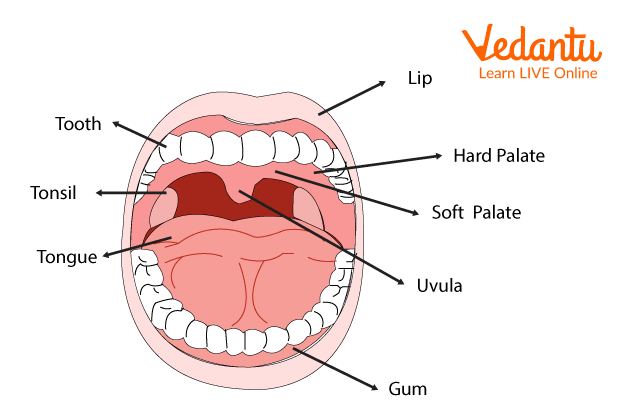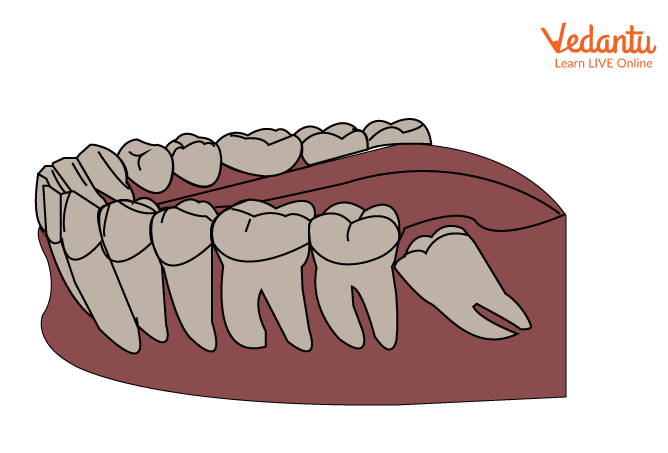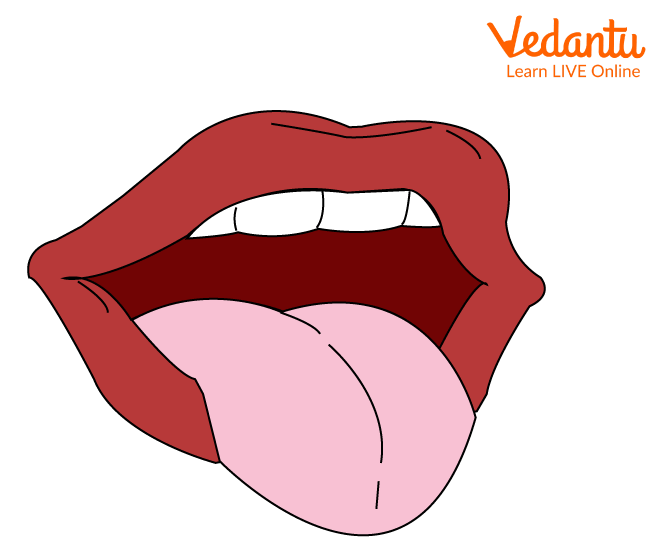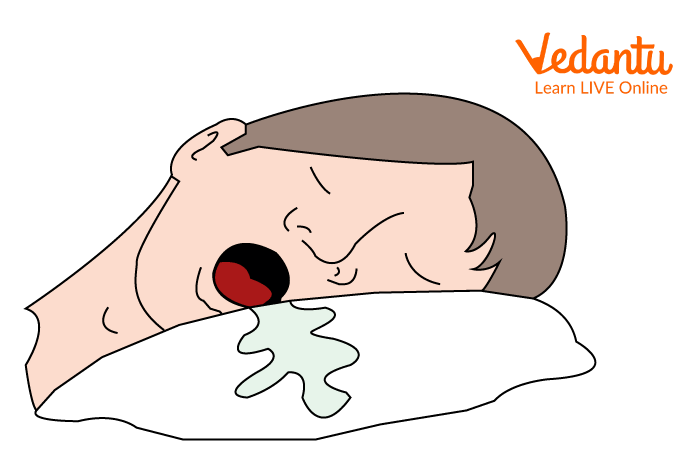




How does Digestion Occur in the Mouth?
Digestion in Mouth begins the moment you bite into some food. So, the mouth is basically an anterior opening made up of the upper and lower lip which opens into an oral cavity. This oral cavity has a certain number of teeth along with a muscular tongue. Teeth, tongue along with a slimy liquid in your mouth known as saliva have the tendency to begin initial stage digestion. Now, this partially digested food then enters the stomach via a tube known as the oesophagus (it is basically a connection tube between your throat and stomach). In the stomach, this partially digested food gets digested completely. The energy extracted from food is used up by the body and the remaining waste is excreted out with the help of excretory organs.

Mouth
Role of Teeth in Digestion(Teeth Digestive System)
Teeth are basically hard, mineral rich structures in our mouth and they are not made up of bone like the rest of our skeleton. They naturally have a unique structure to enable them to break down the food into smaller pieces. So, their basic function is to slice, cut, and tear the food apart in order to make it easily digestible.

Teeth Structure
Role of Tongue in Digestion
Tongue is another important digestive organ which moves food around your mouth to help you chew and swallow because it’s a superstrong, flexible muscle and has a rough surface for good grip so that it can easily push the food against your teeth as you chew. Moreover, it’s because of the tongue that you have a sensation of the taste of your food.

Structure of Tongue
Role of Saliva in Digestion
Saliva is basically a thick, colourless slimy fluid that is constantly present in your mouth. It moistens the food to make it easier to swallow and it has special chemicals in it called enzymes (mainly “Salivary Amylase” and “Lingual Lipase”), these saliva enzymes or mouth enzymes are responsible for breaking down starch and fats in your food into simpler substances.

Secreted Saliva
Solved Questions
1. Describe the role of teeth in digestion.
Ans: Teeth have a natural unique structure which enables them to break down the food into smaller pieces. Thus, they basically slice, cut, and tear apart the foodstuff to make it easily digestible.
2. Describe the role of saliva in digestion.
Ans: Saliva is a slimy fluid present in mouth and basically have two important functions:
It moistens the food to make it easier to swallow.
It has various enzymes in it which are responsible for the partial digestion of food.
3. Why is digestion important for all living beings?
Ans: Food is the only biological energy source for living beings, but all the foodstuffs are generally made up of complex substances, so in order to extract energy from food, digestion disintegrates the food into simple substances such that our body could deprive energy from the same.
Conclusion
All our foodstuffs are made up of fats, proteins, and carbohydrates, these complex substances need to be broken down into simpler substances so that they can be absorbed easily by our body and this digestion primarily occurs in the oral cavity. Thus, in the end, the digestive system’s main motive is to break down energy based compounds into simpler ones and get them in circulation so that they can be used by the body to gain energy and continuously progress in survival.
FAQs on Mouth Enzymes - Digestion in Mouth
1. What are the main digestive enzymes present in the mouth?
The two primary digestive enzymes present in the mouth are salivary amylase (also known as ptyalin) and lingual lipase. These enzymes are components of saliva, which is secreted by the salivary glands and initiates the process of chemical digestion.
2. What is the specific function of the enzyme salivary amylase?
The specific function of salivary amylase is to begin the chemical digestion of carbohydrates. It breaks down complex carbohydrates like starch (a polysaccharide) into simpler sugars, such as maltose (a disaccharide), through a process called hydrolysis. This action starts the moment you begin chewing your food.
3. What are the two main types of digestion that begin in the mouth?
Two types of digestion begin in the mouth:
- Mechanical Digestion: This is the physical breakdown of food into smaller pieces by the action of the teeth (chewing) and the tongue (mixing).
- Chemical Digestion: This is the chemical breakdown of food molecules by enzymes. In the mouth, this process is started by salivary amylase acting on carbohydrates.
4. Are proteins and fats digested by enzymes in the mouth?
No, protein digestion does not begin in the mouth as there are no protein-digesting enzymes (proteases) in saliva. While lingual lipase, an enzyme that digests fats, is secreted in the mouth, its activity is minimal. It becomes fully active only when it reaches the highly acidic environment of the stomach.
5. Why is the chemical digestion of carbohydrates in the mouth important for the overall digestive process?
Initiating carbohydrate digestion in the mouth is important because it kick-starts the entire process, reducing the workload for the stomach and small intestine. This early breakdown ensures that the complex starches have more time to be fully converted into absorbable sugars, maximising nutrient absorption later in the digestive tract.
6. How does the pH of saliva affect the function of mouth enzymes?
The pH of saliva is crucial for enzyme function. Salivary amylase works optimally at a nearly neutral pH, typically between 6.7 and 7.0. This is the natural pH range of the mouth. If the pH were to become too acidic or too alkaline, the enzyme's structure would change, and its ability to digest starch would be significantly reduced.
7. What happens to the action of salivary amylase once food reaches the stomach?
The action of salivary amylase stops completely once the food bolus reaches the stomach. The stomach contains hydrochloric acid, creating a highly acidic environment (pH 1.5-3.5). This strong acid denatures the salivary amylase, permanently altering its shape and rendering it inactive. Carbohydrate digestion then pauses until the food enters the small intestine.









